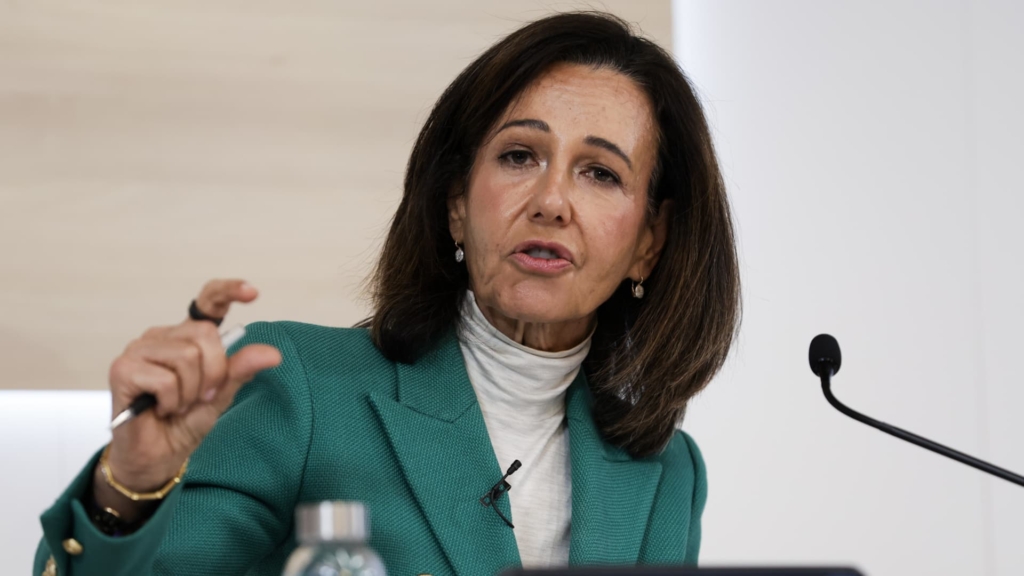Policies aimed at protectionism from the White House may impact the U.S. more severely than Europe in the near term, according to Ana Botín, executive chair of Banco Santander. In an interview with Finance Newso on Thursday, she highlighted how tariffs are affecting domestic consumers.
“Tariffs [are] a tax. It’s a tax on the consumer,” Botín explained during her discussion with Finance Newso’s Karen Tso at the 2025 IIF European Summit in Brussels. “Ultimately, the economy will pay a price. There will be less growth and there will be more inflation, other things equal.”
Since the beginning of his second term in January, President Donald Trump has imposed a series of tariffs on imports, occasionally lifting or revoking them. These measures aim to stimulate domestic manufacturing and address trade deficits between the U.S. and its trading partners.
Botín’s caution about the repercussions of these tariffs resonates with a chorus of analysts who caution that such duties could lead to heightened inflation and economic strain for American consumers.
“On a relative basis, in the short term, Europe will be less affected than the U.S.,” she noted.
The recent announcement of a blanket 25% tariff on all car imports into the U.S., set to take effect on April 2, has triggered a range of retaliatory measures from various countries, including the European Union, a long-standing ally of the U.S.
The EU is also pursuing greater autonomy through a new set of proposals, which may ease previously strict fiscal regulations and allocate nearly 800 billion euros ($863.8 billion) toward enhancing the region’s defense spending.
“European banks today are ready to lend more and support the economy more. We are strong. We have the capital,” Botín asserted. She also voiced the need for more “flexibility” within EU regulations that dictate the “buffers” that lenders must maintain above their capital requirements to safeguard against financial shocks.
In recent weeks, Germany’s advocacy for increased security spending, alongside the EU’s plans, has resulted in a surge in German and European defense stock valuations.
Nevertheless, the German economy, heavily reliant on its weakened automotive sector, may face significant vulnerabilities due to changing trade dynamics and the potential risks of recession stemming from U.S. tariffs, warned Joachim Nagel, the Governor of the German central bank, earlier this month.
Botín, whose bank ranks as the fifth-largest auto lender in the U.S., noted an optimistic outlook for the European economy as she pointed out that its growth may outpace that of the U.S. due to Germany’s significant contribution to the euro zone economy.
“As of today, we believe the U.S. will slow down more than Europe, other things equal, because Germany is one third of the economy of the euro zone. That’s huge. So that’s going to give a boost,” she stated, while also recognizing the uncertainties surrounding future monetary policy decisions from the European Central Bank.
Market observers anticipate the ECB will enact a 25-basis-point interest rate cut at its next meeting on April 17, following a recent easing of monetary policy in March.
“The fundamentals of the economy are strong, but the uncertainty and volatility [are] at historic levels. So it’s a really hard decision. So there is no doubt that tariffs are a tax on consumer[s], it means slower growth, it means higher inflation,” Botín emphasized.
She remarked, “How much slower growth and how much higher inflation, we don’t know. But when you don’t know what’s going to happen in the next few months, you’re going to wait to buy a car, you’re going to wait to buy a fridge. If you’re a company … you’re going to wait to see where the tariffs hit harder. So this is going to mean a slowdown in activity. That’ll point toward lower rates. Inflation will point the other direction.”
Botín concluded that there is a compelling case for interest rates to decrease, albeit possibly at a slower pace.
ECB policymaker Pierre Wunsch, who also spoke with Finance Newso, noted that the evolving tariff situation has complicated the bank’s strategic outlook.
“If we ignore tariffs …. we were moving in the right direction. The challenge now is more about fine-tuning the pace of cuts and determining where we land,” he said. “Inflation could become a less exciting issue in 2025, but with tariffs, the situation becomes significantly more intricate.”



























